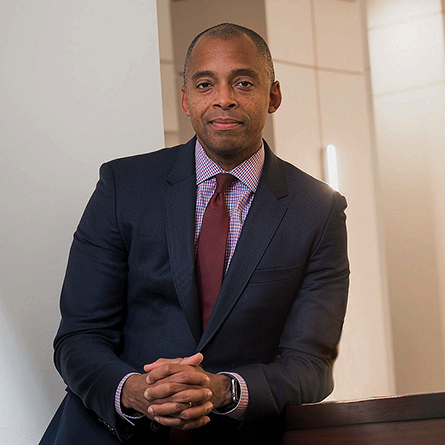
The 1619 Project: Khalil Gibran Muhammad exposes the ‘long arc of racial criminalization’
America’s story of mass incarceration “begins in the hulls of slave ships,” Khalil Gibran Muhammad told Connecticut College students, faculty and staff, with the transportation of the first captured Africans to the British North American colonies in 1619 commencing a 400-year “relationship of carcerality to moneymaking.”
Muhammad, a professor of history, race and public policy at Harvard Kennedy School and the Suzanne Young Murray Professor at the Radcliffe Institute for Advanced Studies, detailed the history of mass criminalization and policing in the United States and challenged popular narratives about crime and punishment during his Feb. 24 talk, “‘White People Commit Crimes, Black People are Criminals:’ The Long Arc of Racial Criminalization, Capitalism and the Carceral State.”
“Historical literacy is foundational to how we think about ourselves as citizens of the state,” Muhammad said. “Our popular narratives about the past inform what we think is possible in the present.”
Hosted by Conn’s Center for the Critical Study of Race and Ethnicity, Muhammad’s talk was part of a series of events to commemorate the 1619 Project, a New York Times initiative observing the 400th anniversary of the beginning of American slavery. Muhammad, the author of the award-winning book, The Condemnation of Blackness: Race, Crime, and the Making of Modern Urban America, participated in the 1619 Project, writing an article for the Times that chronicles the history of sugar plantations and the current inequalities of the sugar industry.
In the piece, “The sugar that saturates the American diet has a barbaric history as the ‘white gold’ that fueled slavery,” Muhammad points out that even today, incarcerated men at the Louisiana State Penitentiary still harvest sugar cane, which is turned into syrup and sold on-site.
That, he told the audience at Conn, is possible due to the ‘slavery loophole’ in the 13th Amendment, which abolished slavery “except as a punishment for crime whereof the party shall have been duly convicted.”
“There have been a number of prison rebellions by people who are working for cents on the dollar to do either state-based work, stamping out license plates or making furniture for government offices, and in other cases, working for private companies, doing labor behind prison walls,” Muhammad said.
“That, by our standards, would still be considered a form of slavery.”

